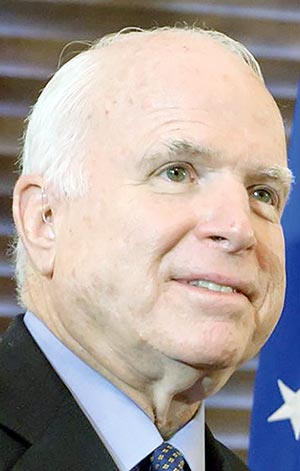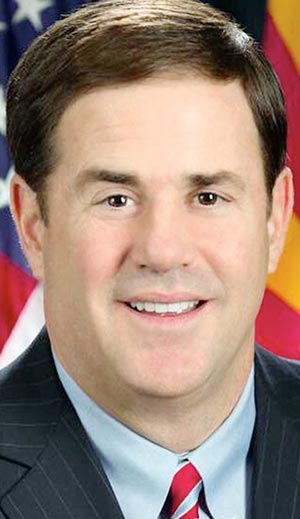
Ducey, McCain to attend Code Talker event, will meet with tribal leaders
WINDOW ROCK
It’s not often that an Arizona delegation of state and congressional leaders visits the Navajo Nation and discusses Navajo issues with Navajo Nation leaders.
Typically, these conversations happen in Southern Arizona, during Indian Nations and Tribe’s Legislative Day, or in the offices of Gov. Douglas Ducey or Sen. John McCain, but with their aides.
Not this time because both Ducey and McCain are visiting the Navajo Nation Friday on National Navajo Code Talkers Day, a day reserved to pay tribute to men known around the world for their contributions using the Navajo language during World War II.

John McCain
Though Navajo Nation President Russell Begaye and Navajo Nation Vice President Jonathan Nez publicly announced the visit of the leaders, Speaker LoRenzo Bates said it was the behind-the-scene political efforts of himself, Arizona Sen. Carlyle Begay, and the Navajo Nation Council’s State Taskforce that started these conversations and the planned visit.
According to Begay, Ducey and McCain will participate in the festivities of Code Talkers Day by signing a state legislative proposal that would allow students to enroll in online or home tutoring classes, a backpack drive, ride in the Code Talker parade and also launch the Code Writers Education Initiative.
The initiative, a partnership between Begay and the Science Foundation Arizona, is an education project that will bring together organizations from business, philanthropy, education and government to create a technology-based education for Navajo children.
“Never have these leaders collectively come to Navajo like this as a delegation,” Begay said, adding that as a state senator it’s been his focus to build a collaborative partnership between tribal communities and Arizona instead of what has historically been consultation talks.
After all, Begay said tribal communities such as the Navajo Nation and Arizona do share common values, hopes and dreams for better communities.
“For these leaders to see and touch and feel the needs that exist across the Navajo Nation, and take into account the Navajo Nation’s issues as a component of the real issues and priorities of the state,” Begay said.
Following those slew of events, the leaders will then meet with Bates and the council’s State Taskforce in a separate meeting.
Bates, who credits Begay for turning the wheels to get the Arizona leaders to the Navajo Nation, said he has invited Begaye, Nez and Eric Descheenie, an executive assistant charged with tribal-state relations, to the discussion with Ducey and McCain.
Bates will share the “One Nation, One Voice” agreement reached among the Navajo Nation’s branch chiefs on July 20 with the state and McCain. The “One Nation, One Voice” agreement highlights the nine priorities of the Navajo Nation – water rights/projects, economic development, and infrastructure. Other areas include housing, education, human services, governance, public safety, natural resources and judicial needs.
Asked if water rights, including a new proposal surrounding the settlement of the Little Colorado River Rights would be part of the discussion, Bates confirmed he would share the Navajo Nation’s concerns with water.
“We’re going to talk about it,” he said. “The message we want to convey to Arizona is a discussion. We want to begin dialogue on securing our claim.”
Bates dubbed these conversations as preliminary, a conversation starter.

Doug Ducey
While Bates and other Navajo leaders share their united vision, Begay said he will also reveal to tribal leaders the four priorities of the state – education, revenue sharing from the transaction privilege tax, energy and natural resources and water.
“It’s important the Navajo Nation have a seat at the table for these issues,” Begay said. “Arizona won’t be what is without the water resources that are coming through the Navajo Nation.”
Ducey, in an emailed statement to the Times, said he was looking forward to visiting with Navajo Nation leaders, especially on a day so important to national and state history Ð National Navajo Code Talker’s Day.
The governor stated that he’s honored to be included in the celebration to acknowledge the heroic contributions of the Navajo Code Talkers, adding the visit to Navajo is also an opportunity to talk with Navajo leadership a shared vision for the future of Arizona.
“The issues critical to our state Ð education, the economy, our natural resources Ð affect all of Arizona, and our tribal nations have a unique and integral perspective,” Ducey said. “I think it’s important that we continue to engage with all tribal nations and communities, and work together to make our state even greater.”
McCain, also in an emailed statement, also wrote proudly of the Navajo Code Talkers and the national holiday reserved for them.
“Using their unique language skills, the Code Talkers devised the only allied code that the enemy was never able to decipher and played a critical role in speeding up our decisive victory over tyranny and oppression,” McCain stated. “We will forever honor their remarkable service and sacrifice to secure our freedom.”
With regards to tribal-federal relations, McCain stated, respecting tribal sovereignty means Congress meets its trust responsibilities and maintain a strong government-to-government relationship with the Navajo Nation.
“As a longtime member of the Senate Indian Affairs Committee, I am well-positioned to advance a number of the Nation’s priorities including the tribe’s right to energy development on tribal lands, promoting tribal economic development, increased federal support education and healthcare, and looking at the upcoming federal Highway bill to address tribal transportation initiatives,” McCain stated.
McCain added that his visit to the Navajo Nation also making sure that the tribe has greater access to drinking water supplies for the future.
“I look forward to listening to Navajo leaders on how we can best coordinate their water priorities with the governor,” McCain said.
To read the full article, pick up your copy of the Navajo Times at your nearest newsstand Thursday mornings!
Are you a digital subscriber? Read the most recent three weeks of stories by logging in to your online account.







 Highway 264,
Highway 264, I-40, WB @ Winslow
I-40, WB @ Winslow